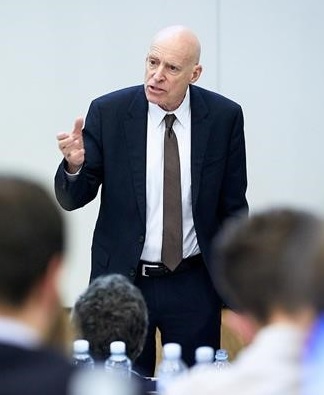Obituary for Professor Edward P. Lazear
On November 23, a few days before Americans celebrate Thanksgiving, Edward Lazear, professor at Stanford’s GSB and senior fellow at the Hoover Institution, passed away.

He was a great economist and a great friend to those who knew him – they are many all over the world – and who are thankful for Eddie, as he was called by most who knew him. His ties to Aarhus go back to the nineties when he began visiting the economics department at the former Aarhus School of Business (ASB) as speaker at seminars, workshops and conferences about personnel economics. Aarhus was one of the first places in Europe where students were taught personnel economics, and faculty like Niels Westergård-Nielsen, Paul Bingley, Nabanita Datta Gupta, Anders Frederiksen, Frederic Warzynski, Valerie Smeets and Tor Eriksson did some work in this new field. Although Eddie’s earlier contributions were mainly theoretical, he was also interested in developing conditions for empirical research on personnel economics. He actually published the first economic analysis exploiting personnel records data in 1989 (from a single firm), and he became an early banner bearer for building matched employer-employee data and often pointed to Denmark as a leading example. Deservingly, he was awarded an honorary doctorate at ASB in 2006. He continued coming to Denmark, and his expertise in personnel topics was also used in Lotte Bøgh Andersen’s LEAP project (at AU’s political science department) in which he served as a member of the advisory group.
Eddie spent the first twenty years (1974-95) of his career at University of Chicago before moving to Stanford where he was Davies Family Professor at the GSB and a Senior Fellow at the Hoover Institution. It is no exaggeration to say he was one of the foremost labour economists of his generation. He is best known for being the founder of the field of Personnel Economics, and his seminal works on the tilted wage curve, tournament theory, sorting and reward schemes, determinants of entrepreneurship and leadership, in which he applies simple and elegant, yet powerful models to explain complex problems, are now standard elements in the curricula of courses in personnel, labour and organizational economics. Characteristic of his work is that he wrote one or two papers on a subject and then moved on to the next. He was always open for new ideas. He had an impressive energy and productivity, especially in view of the fact that he spent a lot of time talking with people, and moreover was running, skiing, biking, and surfing.
He was an entrepreneur also in other respects. Thus, he founded the Journal of Labor Economics (served as its editor for a couple of decades), the premier field journal in labour economics, the Society of Labor Economics (later became its president), and the Personnel Economics group at NBER. Many of us in Aarhus have taken part in SOLE and NBER activities and benefitted tremendously from them.
His Wicksell Lectures from 1995 is the first book on personnel economics written for an academic readership. Eddie was also an unusually gifted teacher and disseminator of economics research. He could often summarize the ideas in his paper in a single, easy-to-remember figure. Three years later came his textbook based on his MBA teaching, of which there have been two more recent editions co-authored with Mike Gibbs.
He also made several lasting contributions to labour economics more generally. Examples are his research on education production, gender differences in pay and promotion, language and culture, and immigration. Many remember him as a great seminar and conference participant generously giving helpful comments on others’ work. Eddie was one of those scholars you wanted in the audience when giving a presentation as his comments and views would help you to move forward. In view of recent events, one thing worth pointing out is that he was admired by and worked (co-authored) with both liberal and conservative economists. Eddie was appointed Chief of the Council of Economic Advisers in 2006. Outside academia, he is best known for playing a critical role in the US government’s response to the 2007-9 financial crisis. This was not popular in all circles at the time, but its success significantly contributed to save the world economy from a greater disaster. It is on occasions like that when high quality advice offered by persons with high personal integrity matters the most.
Eddie travelled a lot; he could be in three continents in three weeks, but he always tried to go home in between. Only a few years ago, Eddie and his wife Vicky moved to a new home in Reno, Nevada closer to where their daughter, Julie, lives. Clearly, the plan was to spend many years there. Sadly, it did not turn out that way. He will be sorely missed by his numerous colleagues and friends.
Honour to his memory.
Tor Eriksson









